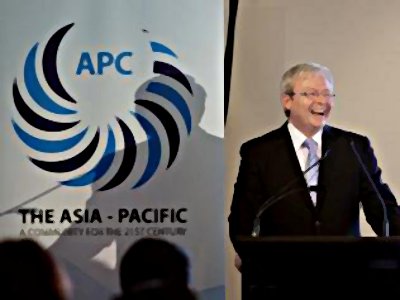Yet the APC is not a wholly novel idea: the proposed APC and existing ASEAN institutions share a similar framework, are directed toward the same professed goal and share the same elite participants. It is because of these similarities that the APC cannot be a panacea for entrenched regional problems.
A similar framework – the same problems
There are two options for dialogue and action in a regional context. The first is a direct approach, where economic cooperation is pursued in tandem with explicit efforts to resolve security disputes. The second is an indirect approach, which prioritizes economic cooperation and assumes that economic interdependence will create security interdependence and hence prevent conflict. The APC proposal is an example of this direct approach. ASEAN, and other regional institutions like APEC and the APT, are examples of the indirect method.
The indirect and direct methods are, however, two sides of the same damaged coin. Neither approach can completely solve long-standing disputes in the Asia Pacific.
Dealing first with the indirect approach, ASEAN’s economic cooperation has indeed produced cooperation on security issues such as transnational crime and terrorism. Yet it has failed to address some of the more fundamental roadblocks to East Asian regionalism; territorial disputes in particular remain latent sources of instability.
Similarly, the direct approach will not help in the face of outstanding territorial disputes. In 2008, Australian Prime Minister Kevin Rudd made the case for the APC and included India as a potential member. According to Prime Minister Rudd, Kashmir, like Taiwan and the Korean peninsula, is a ‘flashpoint’ that could be solved by the formation of a comprehensive institution prepared to directly tackle regional tensions. However, despite pressure from the UN, the world’s pre-eminent multilateral institution, India remains attached to the resolution of Kashmir on a bilateral level. Similarly, China will continue to resist any direct multilateral attempts to intervene in disputes involving the Taiwan Straits and the South China Sea.
The same end goal – the same associated problems
ASEAN and the APC share an ultimate end goal: to produce a pan-Asian identity to prevent inter-state conflict. Some commentators argue that a sociological ‘community of states’ is a better way to achieve this goal than ASEAN’s ‘soft’ interstate cooperation. This proposition is not tenable.
A security ‘community’ essentially involves a cognitive transition among state elites that produces a ‘we feeling’ and makes war unthinkable. Yet the formation of ASEAN has already produced this ‘we feeling’ among elites, and is unable to prevent increased military spending in the region. Re-badging a tattered idea cannot hide conceptual cracks in the framework. Despite the use of the term ‘community,’ the APC will have to grapple with the same tensions that ASEAN and associated institutions have been tackling for decades.
Identical elites – identical problems
Like ASEAN (and related institutions), the APC will necessarily involve state elites who are, to varying degrees, conditioned by realpolitik. Realpolitik sees states as engaged in a zero-sum competition for power. According to this world-view, states must focus upon their narrow self-interest, which is defined in competition to other states. Realpolitik has presented a problem for ASEAN, notably it has precluded the imposition of ASEAN-wide sanctions on Myanmar as states such as China have attempted to preserve their own security interests. It will also present a problem for the APC.
Indeed, Australia’s attempts to promote the establishment of the APC are already illustrating the problems with realpolitik. Extensive diplomatic parleys are met with remarks of a ‘lack of appetite’ for new institutions and calls to strengthen existing institutions. Even the European Union, the best example of an international community of nation-states, was driven primarily by realpolitik calculations. The Second World War, unity forged by anti-communism, the Franco-German rapprochement and the creation of NATO enabled a certain resolution of realpolitik concerns, allowing for an effective regional community.
Proponents of the APC claim it is essentially a new idea that improves upon existing bodies. The three concerns raised here belie this claim to novelty. Even if the APC provides a source of rich deliberation over the future of Asia, its narrative of innovation is beset with limitations.
Deepak Nair is a research associate at the Institute of Southeast Asian Studies, Singapore.

